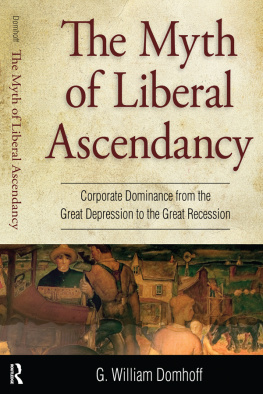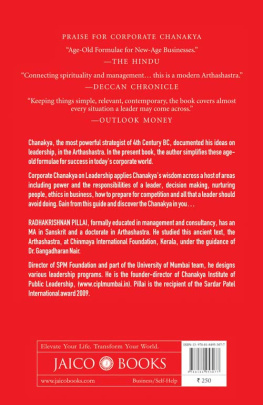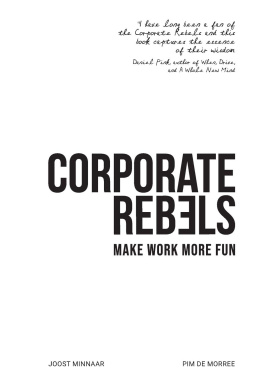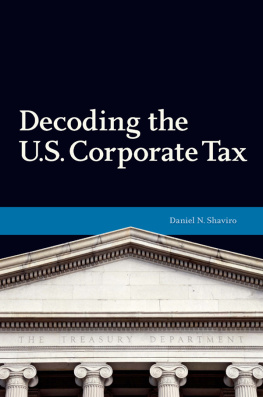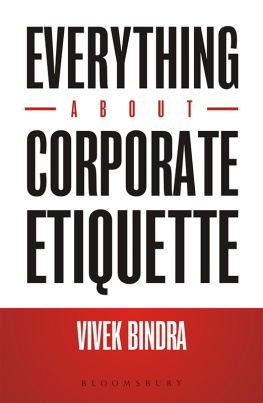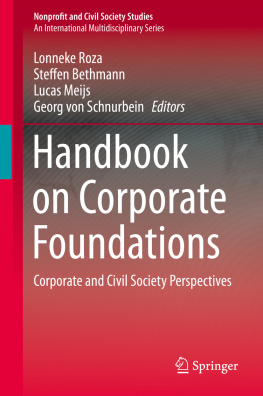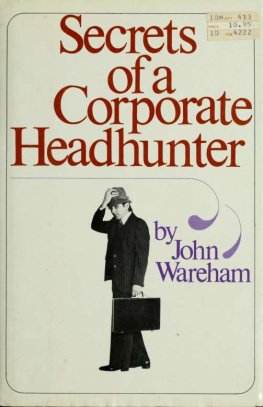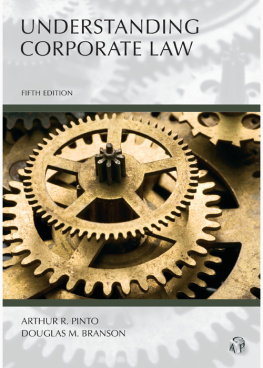The Myth of Liberal Ascendancy
The Myth of Liberal Ascendancy
Corporate Dominance from the Great Depression
to the Great Recession
G. WILLIAM DOMHOFF
First published 2013 by Paradigm Publishers
Published 2016 by Routledge
2 Park Square, Milton Park, Abingdon, Oxon OX14 4RN
711 Third Avenue, New York, NY 10017, USA
Routledge is an imprint of the Taylor & Francis Group, an informa business
Copyright 2013, Taylor & Francis.
All rights reserved. No part of this book may be reprinted or reproduced or utilised in any form or by any electronic, mechanical, or other means, now known or hereafter invented, including photocopying and recording, or in any information storage or retrieval system, without permission in writing from the publishers.
Notice:
Product or corporate names may be trademarks or registered trademarks, and are used only for identification and explanation without intent to infringe.
Library of Congress Cataloging-in-Publication Data
Domhoff, G. William.
The myth of liberal ascendancy : corporate dominance from the Great Depression to the great recession / G. William Domhoff.
p. cm.
Includes bibliographical references and index.
ISBN 978-1-61205-255-7 (hardcover : alk. paper)
1. CorporationsUnited StatesHistory. 2. Elite (Social sciences)United StatesHistory.
3. LiberalismUnited StatesHistory. I. Title.
HD2785.D663 2013
338.7'40973dc23
2012041702
ISBN 13: 978-1-61205-255-7 (hbk)
ISBN 13: 978-1-61205-256-4 (pbk)
Contents
This project started out as an attempt to understand the conservative turn in American public policy that apparently began in the mid-1970s. But research for the background chapters gradually led to the conclusion that American public policy has been moving rightward since 1939, with slight interruptions due to World War II, the Korean War, and the civil rights movement and the movements it inspired. For those of us over age fifty, the book ends up as the story of everything that was going on in the higher circles while we were too busy living our own lives to notice. For those under age fifty, it is the story of how the United States came to be, by 1984, almost exactly what it is today, with no major turning points in the distribution of power since that time, just increasing corporate domination.
The book draws upon my interviews with business leaders and policy experts who were active in the 1970s, and my subsequent research in historical archives, but it owes more to the brilliant detailed work by a wide range of experts that have dealt with an array of specific issues in dozens of studies over the past fifty years. It is therefore a work of synthesis as much as it is a presentation of new research. I hope I have been able to do justice to the many original studies I reply upon, and I apologize in advance to their authors for any sins of misunderstanding or omission. Although the book makes an empirical case for corporate dominance from the 1930s to 2012 based on their work and mine, it does not use this conclusion to try to support any general theory.
I am indebted to many people who helped make it possible to complete this project, which actually began in the late 1980s and was postponed several times to complete other work. I never could have finished this book without being able to draw upon the colleagueship of these wonderful members of the scholarly network, who saved me scores of hours in the library and on the Internet. The collective impact of their responses on the quality of the book and the time it took to complete it was enormous from my point of view as an interloper into many areas in which I previously had little or no knowledge.
I thank my longtime coauthor, Richard L. Zweigenhaft, for his many editorial suggestions that made the manuscript much more succinct and readable. It is always reassuring to have a friend who is comfortable pointing out mistakes, inconsistencies, redundancies, poor word choices, and awkward phrases. I also want to thank John Manley for very helpful comments based on his careful reading of the entire manuscript, and Kevin Boyle, Michael K. Brown, Alec Campbell, Jennifer Delton, James A. Gross, Howard Kimeldorf, Allen Matusow, Harvey Molotch, Thomas F. Pettigrew, Jill Quadagno, Brian Waddell, Michael J. Webber, and Charles Whitham for commenting on chapters or sections of chapters in which I was drawing in good part on their expertise and original research for an understanding of the topic under discussion.
I am grateful to Sol Hurwitz for correcting many mistakes and misunderstandings in relation to the work of the Committee for Economic Development, the business group I use as my primary vantage point on power conflicts, in which he was an important figure for over three decades in the late twentieth century. I was deeply informed by a stunning background memorandum that Richard Wilbur, a key staff aide to Republican leaders in the House of Representatives in the 1960s and 1970s, wrote on the legislative struggle over the Family Assistance Plan in 19691970. He also furthered my understanding of both moderate and ultraconservative Republicans in Congress. I thank Mark A. Smith for providing a copy of his detailed findings on the stance taken by the US Chamber of Commerce on important pieces of legislation that passed Congress and became law during several decades of the postwar era.
I am also grateful to Patrick Akard, Steven Bank, Thomas Bethell, Sarah Blinder, W. Elliot Brownlee, Alec Campbell, Robert M. Collins, David Golland, Sanford Jacoby, David Cay Johnston, Wojciech Kopczuk, Jeff Manza, Mark Mizruchi, Nick Paretsky, Jill Quadagno, Alejandro Reuss, Benjamin W. Smith, and Peter Swenson for providing information and sources in their areas of expertise in answer to my specific questions to them. I thank Clifford Staples for information and sources related to the Business Roundtable. I thank my research assistants of twenty-five years ago, Robert Bulman and Bristow Hardin, now well established in their own careers, for the work they did on lobbying and campaign donations by members of the Committee for Economic Development.
In closing, I want to pay special thanks to Dean Birkenkamp of Paradigm Publishers for his support and friendship over the years, and especially for his many excellent editorial suggestions throughout this project.
Once upon a fairly recent time, according to a widely known American fairy tale, the United States was a liberal nation, thanks to the New Deal that emerged from the Great Depression and the Kennedy and Johnson administrations in the 1960s. But somewhere along the line, things began to go the other way, to the right. Did it all start with tensions within the liberal-labor alliance over the demands of the civil rights movement for the integration of neighborhoods, schools, and workplaces, as used to be thought? Or did the downfall happen in the second half of the 1970s, when corporations decided to flex their muscles, which is the new conventional wisdom? Or was it primarily a product of the Reagan administration and its merry band of tax cutters, as other recent analysts claim?
WISTFUL ROMANTICISM
Although rival analysts disagree on when things started to move rightward in the United States, almost all of them agree that the United States was led toward greater equality by a New Deal coalition for most of the years before and after World War II. This coalition within the Democratic Party was all the more impressive because it depended upon an unlikely voting alliance of southern whites, workers who belonged to unions, white ethnic Americans who lived in big cities, African Americans outside the South, and the small minority of people of any race, creed, color, or social class who for unknown reasons became liberals. The impact of this complex coalition seems obvious in retrospect if the focus is on party labels and numbers. After all, the Democratic Party controlled the presidency in thirty-two of the forty-eight years between 1933 and 1980 and held majorities in both the House and Senate during that period, except for brief Republican interludes in 19471948 and 19531954.
Next page
